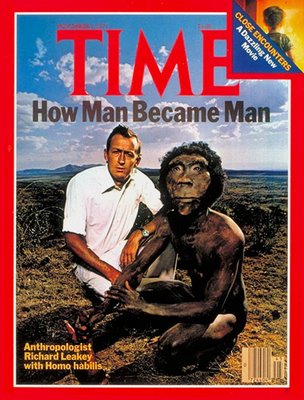
One of the hazards of living in Africa is having an anthropologist dig up your back garden. I once saw Richard Leakey pottering about with a trowel, collecting bone fragments and gassing away to his minions as if he knew what he was talking about. When he saw me, he made his salaams and invited me into his tent to discuss his latest theory on “the ascent of man”.
I listened patiently to the eminent earth-digger expound his thesis with much arm-waving, his Adam’s apple bobbing up and down like a cork in water. The gist of his argument was that walking upright gave early humans the confidence and poise to carry weapons and scavenge for meat. He imagined that a group of these proto-humans would sneak up on some lions at a kill, make a lot of noise and spear the pride male up the arse. The lions would then scatter in panic, leaving the carcass for the hominids to chop into pieces and carry home to the cooking pot. When he had finished talking, I scratched my neck and gave the following response:
“Leakey,” I declared, “your theory is weak. No weapons fashioned before the Age of Iron would have been effective against the lion, and a pride would not meekly surrender its supper to a gang of upright apes making rude noises. I would also remind you that most lion kills are made at night. Do you really imagine that your ancestors, with their poor night vision, would have dared confront such fearsome predators in the dark? Had they done so, they would have merely added their own flesh to the lions’ feast.”
Leakey ground his teeth and asked me, sardonically, why I thought that humans had evolved their preference for walking on two feet.
“Good question, Leakey!” I replied. “Being upright allowed early humans to peer over the long savannah grass and spot danger from a distance. The erect stance enables a prey animal to carry out evasive manoeuvres in good time to hide from its predators. Your ancestor was not ‘man the hunter’ but ‘man the hunted’. In fact, these hominids were so adept at concealment that many of their hairy cousins doubted whether they actually existed. They were not dissimilar to the mythical fairies and elves in your story books.”
Leakey was not pleased with my explanation and stuck doggedly to his wrong-headed views. Our meeting occurred many years ago, but since then an exhaustive examination of ancient bones and teeth has provided further evidence on these matters. The conclusion is that early man ate very little meat himself, but quite often ended up as the main course for various carnivores that knew how to winkle him out of his hiding places. I see no reason to rub it in by sending Leakey a gloating e-mail.
I still get visits from anthropologists now and again, eager to exchange ideas and test out their theories on me. One of them found a fibrous substance in an excavation site and speculated that it was some sort of herbal remedy used by early humans. He gave me a sample to examine. I sniffed a bit of the stuff and said: “It’s dried elephant dung, my good fellow. I shouldn’t put it in your tea if I were you.” He shrugged his shoulders and returned earnestly to his work.
You have read this article with the title Taking a Leakey. You can bookmark this page URL http://celebrityapprenticey.blogspot.com/2006/03/taking-leakey.html. Thanks!









